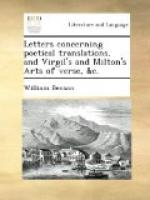To give another Example or two of the same nature.
“Urbs antiqua fuit, Tyrii
tenuere Coloni,
Carthago, Italiam contra, Tyberinaque longe
Ostia, dives opum, studiisque Asperrima Belli.
“Against the Italian Coast, of ancient Fame
A City rose, and Carthage was the Name;
A Tyrian Colony, from Tyber far,
Rich, rough, and brave, and exercis’d in war.
Mr. Pit’s AEneid.
“—Facti de Nomine
Byrsam,
Sed vos, qui tandem, quibus aut venistis ab oris,
Quove tenetis iter?—
“Hence Byrsa nam’d.—But
now ye Strangers, say,
Who, whence you are, and whither lies your Way?
I have chosen here three Passages of three very different kinds, and in all of them the English appears to be much more concise than the Latin; neither is there any thing wanting in the Fulness of the Sense, or in Majesty, or in Harmony of Numbers, any more in the two last Passages than in the former. Another Instance of this kind might be produced out of Virgil’s most perfect Work, the Georgick, although it wants the Advantage of being translated by such a Hand as Mr. Pit’s.
“Si vero Viciamq; seres vitemq;
Faselum,
Nec Pelusiacoe curam aspernabere lentis.
“But if the Vetch you sow, or meaner
Tare,
Nor shall disdain th’ AEgyptian
Lentil’s Care.
In the Latin there are thirty Syllables in the two Lines, in the English but twenty one. So that the English is almost one third more concise than the Latin; and at the same time Virgil’s Sense fully expressed.
I will conclude this Letter with the Opinion of a Foreigner concerning our Monosyllables: A Person not at all prepossessed in favour of our Language.
“The English Language, besides the most significant Words borrowed from the Latin, Greek, &c. and often shortned, hath a vast Stock of its own, and being for the most part Monosyllables, no Speech is capable of expressing Thought in Sounds so few as the English does: This is easily observed by the Translations of the English into Foreign Languages.




